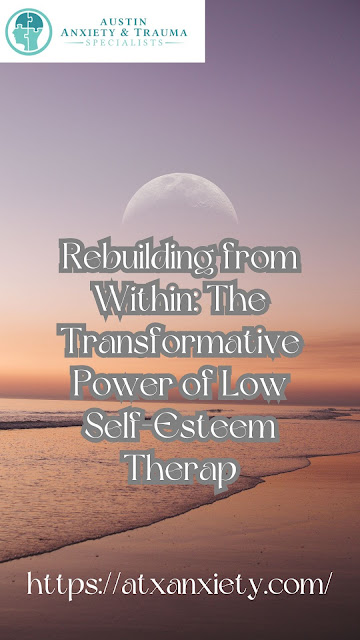Rebuilding from Within: The Transformative Power of Low Self-Esteem Therap
In a world that often places immense pressure on individuals to meet unrealistic standards, the impact on mental health, particularly self-esteem, cannot be underestimated. Low self-esteem can permeate every aspect of one's life, affecting relationships, professional success, and overall well-being. Thankfully, the field of psychology has recognized the significance of addressing and treating low self-esteem through therapy. In this blog, we will explore the transformative power of lowself-esteem therapy, shedding light on its principles, benefits, and how it empowers individuals to build a healthier, more positive self-image.
What is Low Self-Esteem?
Low self-esteem is characterized by a
negative and often inaccurate perception of oneself. Individuals with low
self-esteem may harbor feelings of inadequacy, self-doubt, and a persistent
belief that they are not worthy of success or love.
Causes of Low Self-Esteem:
Various factors contribute to the
development of low self-esteem, including childhood experiences, societal
expectations, trauma, and negative self-talk. Identifying the root causes is a
crucial step in the therapeutic process.
The Role of Therapy in Addressing Low Self-Esteem:
Mindfulness-Based Approaches: Mindfulness techniques, such as meditation and self-reflection, are
integrated into therapy to help individuals become more aware of their thoughts
and emotions. This increased awareness allows for a more objective and
compassionate understanding of oneself.
Exploration of Core Beliefs: Anxietyspecialists work with
individuals to explore and challenge core beliefs that contribute to low
self-esteem. This may involve examining long-held assumptions and replacing
them with more accurate and positive perspectives.
Building Self-Compassion: Therapy emphasizes the importance of self-compassion—a fundamental
aspect of cultivating healthy self-esteem. Learning to treat oneself with
kindness and understanding is a key component of the therapeutic process.
Benefits of Low Self-Esteem Therapy:
Improved Mental Health: Therapy provides a safe space for individuals to express their feelings
and concerns. Therapy for self-esteem addressing and working
through issues related to low self-esteem, individuals often experience a
significant improvement in their overall mental health.
Enhanced Relationships: Low self-esteem can negatively impact relationships. Through therapy,
individuals learn to communicate more effectively, set boundaries, and develop
healthier relationship dynamics.
Increased Confidence: As individuals challenge and overcome negative thought patterns, they
often experience a boost in self-confidence. This newfound confidence extends
to various aspects of life, including work, social interactions, and personal
pursuits.
Empowerment and Self-Discovery: Therapy facilitates a process of self-discovery and empowerment.
Individuals gain a deeper understanding of their strengths, values, and unique
qualities, leading to a more positive and authentic sense of self.
What does it mean to be Neurodivergent?
If you are searching for "whatdoes it mean to be neurodivergent," let's learn more here.
Neurodivergent is a phrase that refers to individuals whose neurological
evolution and functioning counter what is regarded as typical or
"neurotypical." It encloses a range of conditions, including but not
limited to autism, attention deficit hyperactivity disorder (ADHD), dyslexia,
and others. The concept of neurodiversity emphasizes the idea that neurological
differences are natural variations of the human brain rather than defects that
need to be fixed.
Being neurodivergent means having a
brain that functions in ways that diverge from the dominant societal norms. The
neurodiversity movement promotes acceptance, understanding, and accommodation
for individuals with diverse neurological profiles, recognizing the value and
contributions that neurodivergent individuals bring to society.
It's important to note that the term
"neurodivergent" is a broad term, and it emphasizes the idea that
neurological differences should be respected and accommodated rather than
stigmatized or pathologized.
Conclusion:
Low self-esteem therapy is a
transformative journey that empowers individuals to break free from the shackles of self-doubt and embrace a more positive
self-image. By addressing the root causes of low self-esteem and equipping
individuals with tools to challenge negative beliefs, therapy becomes a
catalyst for personal growth and well-being. In a world that often emphasizes
external validation, low self-esteem therapy offers a profound reminder that
true strength and resilience come from within.




Comments
Post a Comment